With the amount of Parvo cases we have already had this Spring, it is time to write a post about this potentially deadly disease.
What is it?
Parvovirus is a highly contagious virus that unvaccinated young dogs and puppies under 4 months of age are highly susceptible to. This virus affects the gastrointestinal tract of dogs that are exposed. This virus is spread by dog to dog contact, and if an unvaccinated puppy is around any infected stool from a dog that has parvo. This virus contaminates all surfaces and inanimate objects. It can live on clothes, human hands, shoes, water bowls, concrete, grass- basically anything that has been touched by a dog that is parvo positive will harbor the virus on its surface for a VERY LONG TIME. It can live in the soil for over a few years. Meaning if you just rented a new house and you have a puppy that has not been vaccinated, and you let them out to potty, it is possible that they can get parvo. Are you scared yet? Let’s talk some more about parvo.
When I first started working at Independence approximately 3 years ago, I had no idea what Parvo even was. Sure, I knew it was important to vaccinate puppies, but I had never actually witnessed what can happen to the puppies that are not vaccinated. I learned very quickly the destruction it can cause. It is so contagious, that at one time when I had my own puppy at home, I would not touch him or get near him until all of my clothes from work were changed and put into the washer with bleach. So much so that I would take my shoes off at work and wear rubber boots to walk from my car to my home.
Symptoms
The first signs of parvo tend to be lethargy and inappetence, followed by vomiting and diarrhea. Fever is common, along with abdominal pain and bloating. Puppies tend to vomit constantly, and sometimes will have liquid and bloody diarrhea. With all of that going on, dehydration happens quickly and can cause septic shock. Puppies tend to die from this amount of dehydration, that has a rapid onset and quickly progresses. Most deaths from Parvo occur 48-72 HOURS after onset of symptoms. This can happen even faster in very small puppies (think Chihuahua, Yorkshire Terriers). The incubation period for Parvo is 7-14 days. This means that after your puppy comes into contact with the parvo virus, within the 7-14 days they will start to get sick and start showing these symptoms.
Diagnosis
When we get a call about a young puppy that has been having some diarrhea, and then started vomiting, our first thought is always parvo. Multiplied by ten when we discover that the puppy has not ever had vaccines. We do have a test for Parvo that

takes about ten minutes to run in the clinic. We take a sample from the puppy and put it into the test. One dot means negative, two dots means Parvo positive. The top dot in the center appears as a control, to let us know that the test is working properly. The second, darker spot is positive. And then we have to get to work very quickly if we hope to save that puppy.
Treatment
There is no “cure” for Parvo, as it is a virus. We have to let it run it’s course. Basically, treatment consists of supportive care to hopefully keep the puppy alive while its body takes on the biggest battle of their short lives, until their immune system is strong enough to fight off the virus on its own. We immediately bring the puppy into the back, and get started setting an IV to deliver fluids to bring the puppy back from the brink of shock due to dehydration. We start medications to support the gastrointestinal tract to reduce vomiting and diarrhea, which also helps to slow down the level of dehydration. And we also start antibiotics to ward off any secondary infections because the immune system is so compromised. Some cases that are really bad, must have a blood or plasma transfusion. The problem with Parvo is simply how contagious it is. We literally have a complete Parvo Battle suit that any one of us that treats parvo has to suit up to be able to touch the puppies. One of the hardest things about treating a parvo case is when the puppy looks up at you and just wants to be comforted and held, but you’re wearing so much gear to protect from the spread of the virus that you can’t just pick them up and hold them. Here is a picture of Dr. Sam treating a recent Parvo case.

As you can tell, the parvo puppies must be kept in complete isolation. Which also does not help their spirits much. They don’t understand why they are alone or that whenever they see a human they are dressed in all that weird gear.
Sometimes the puppies come in and they are already laid flat out and are barely responsive. These are the hardest cases to battle against and reverse the odds for the puppy. Early recognition and aggressive treatment is the number one aid to a successful outcome, but even having this on our side, not all puppies survive. We do have a very good record at the clinic- usually we can save them. But there are those few that have already gone so far down, it is hard to bring them back from the brink. Usually these are the tiny 2-3 pound puppies that we have the hardest time saving. When they are so small, are already dehydrated, are anemic and have lost the look in their eyes of wanting to survive, it is a very uphill battle.
Prevention
Are you worried about parvo yet? While it is not really my goal to scare our readers, I do want to inform you. And by letting you see how deadly this disease can be, it may secure a few more people to realize just how easily it is prevented.
So the big question… how is this deadly disease prevented? Wait for it… VACCINES!! I know, I know, sounds too simple to be true. And really, it is not just as simple as giving one vaccine. So let me explain:
When puppies are born, they are given maternal antibodies against viruses from their mother while in utero and also by drinking milk once born. If the mother has been vaccinated, it gives the puppies a leg up over a litter whose mother was not vaccinated. Now, as the puppies grow, those maternal antibodies begin to diminish. Enter vaccines, stage left. While these maternal antibodies are starting to diminish, we come in and give the puppies vaccines at intervals to hopefully time take over when the maternal antibodies are completely gone. While they still have those antibodies from mom in their system, it makes the vaccine not as powerful. So, we begin vaccinating puppies at 7-8 weeks, 11-12 weeks, and 15-16 weeks. By giving the puppies three vaccines, we are upping their immunity, and also have a higher chance of getting full blown immunity at the exact time the mother’s antibodies leave the puppy’s system. Usually by 16 weeks, all maternal antibodies are gone, so finishing the vaccine protocol at this time is the goal. Now I know a few people will be saying “well heck, I’ll just wait until my pup is 16 weeks old and get him one vaccine then”. While “normally” all maternal antibodies are out of the system by 16 weeks, this does not mean that it is the case with every puppy. Some puppies might lose maternal antibodies at 9 weeks. Or 10, or 6. Basically, we have no idea when each individual puppy will lose these antibodies. So, we do the best and recommended protocol, by vaccinated at 7-8 weeks, and following with two boosters 3-4 weeks apart.
Another good practice for prevention, is to keep your puppy away from unvaccinated or strange dogs. Don’t take them to the dog park until they have had all of their vaccines. As we discussed earlier, Parvo is such a hardy disease, it can be waiting anywhere. Until your puppy has had all of their shots, I would recommend staying home. Taking them outside to potty, and then bringing them back inside. I see lots of young puppies being pulled around on leashes when I go to my step-son’s baseball games. Every time I see one, I worry about their risk of getting parvo, and wonder if the owners have any idea about the risk.
The next thing I want to mention. Distemper/Parvo vaccines are $16. If you add in Lepto (a bacteria that dogs of any age can get), it is $18. The general treatment for Parvo is bordering right at $1000, sometimes a little less, sometimes a little more. And we can’t always guarantee survival. That’s a lot of money and a lot of heartache that could have been avoided for a $16 vaccine.
A few more things I wanted to mention. There is a lot of talk out there about over vaccinating, and using homeopathic treatment to treat a puppy for parvo. If this is something you’re interested in, I can’t stop you. But please be aware of how quickly this virus can progress to a fatality. And if what you’ve been doing at home hasn’t been working, realize that we are already starting off behind the ball when you finally do bring the puppy to us. It is hard as a veterinary field member to lose a puppy to parvo. It’s even harder because we know it could have been prevented. I can’t tell you the number of parvo cases we have had to just put down because the owner did not have the money for treatment, or opted not to spend that amount of money. Even the process of euthanizing cost more than the vaccine that could have prevented the puppy from getting the virus in the first place.
So, if you’re getting a puppy, please be sure to educate yourself, and get that pup vaccinated. If your friend is getting a puppy, send them over to this blog to educate themselves, and demand that they vaccinate their puppy.



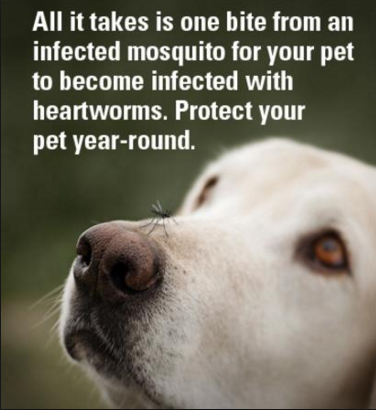
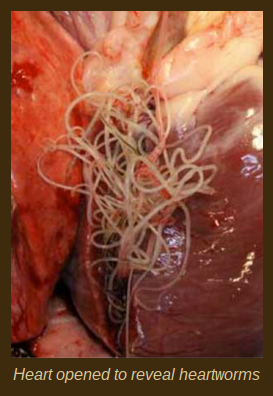 Heartworm disease can kill your dog. It is something that is easily preventable, but many people do not understand the risks their dogs face.
Heartworm disease can kill your dog. It is something that is easily preventable, but many people do not understand the risks their dogs face. ream and end up in the pulmonary artery of the heart. Left untreated, larvae can grow into adult worms in just over 6 months (reaching one foot in length!)—
ream and end up in the pulmonary artery of the heart. Left untreated, larvae can grow into adult worms in just over 6 months (reaching one foot in length!)—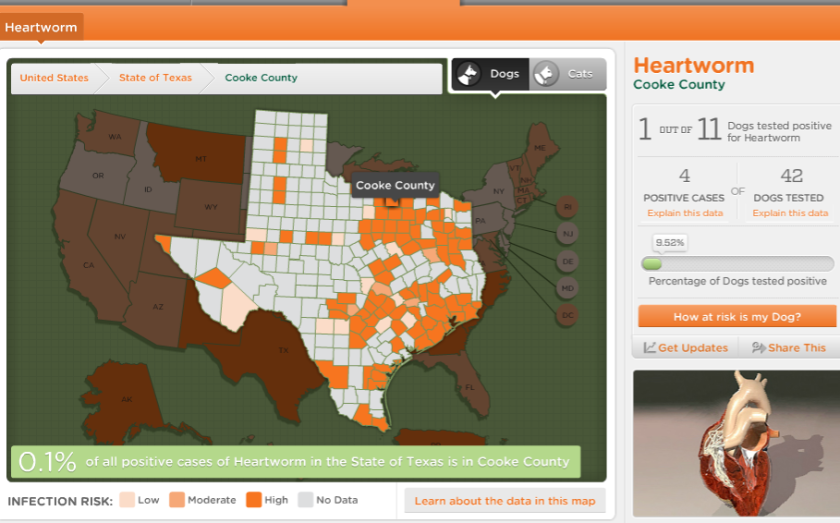
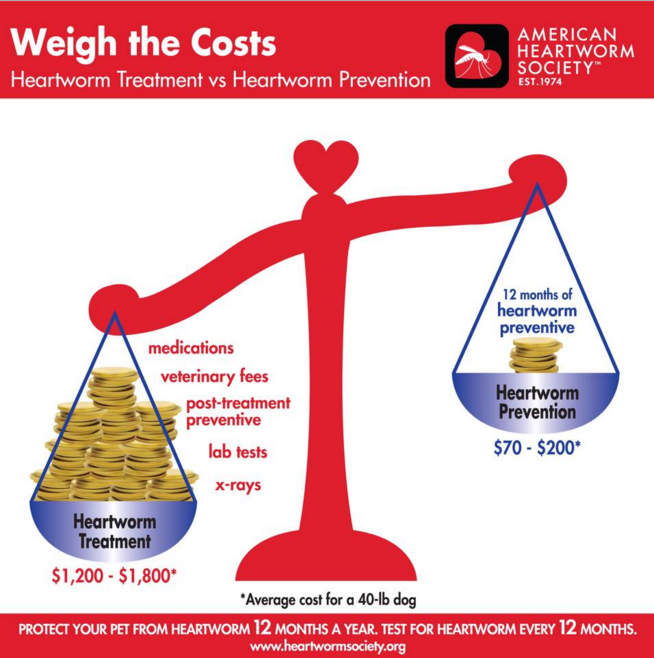
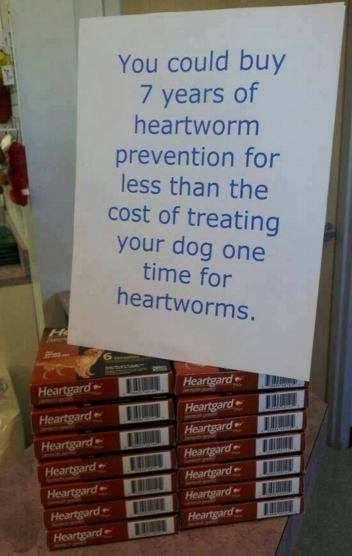 heartworms, give the clinic a call. We would be happy to see you and your dog, answer any questions you might have, and help you get on the right track with a monthly prevention. Use this month and the specials we are running as a time to finally take that step and give your dog the best care you can offer by protecting them from this deadly disease. Your dog will thank you for it.
heartworms, give the clinic a call. We would be happy to see you and your dog, answer any questions you might have, and help you get on the right track with a monthly prevention. Use this month and the specials we are running as a time to finally take that step and give your dog the best care you can offer by protecting them from this deadly disease. Your dog will thank you for it.